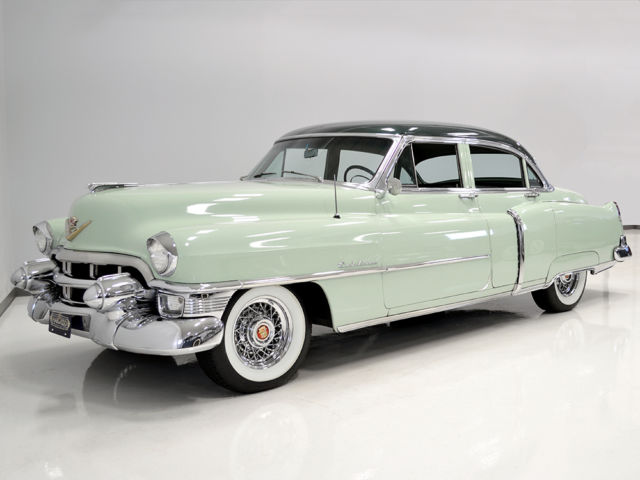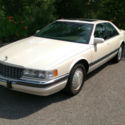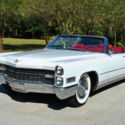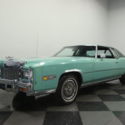19,928 ORIGINAL MILES! Awesome survivor, loaded with options, drives like new!
| Make: | Cadillac |
| Model: | Other |
| SubModel: | Series 62 |
| Type: | Sedan |
| Year: | 1953 |
| Mileage: | 19,922 |
| VIN: | 5362109626 |
| Color: | Green |
| Cylinders: | 8 |
| Fuel: | Gasoline |
| Transmission: | Automatic |
| Interior color: | Green |
| Vehicle Title: | Clear |
| Item location: | Macedonia, Ohio, United States |
1953 Cadillac Other Series 62 Additional Info:
Next time you go to a car event, position yourself near the entrance so you can listen to the cars coming in. I don't necessarily mean enjoy the exhaust note (although that can be awesome), I mean listen to how well the cars run. In most cases, you'll hear snuffling, stuttering, stumbling and other audible maladies that most folks just accept as part of the old car experience. But the truth is, it's only through the passage of time that we've come to accept these shortcomings, offering excuses like, "It's old, it's supposed to run rough, that's just how they were." I say this because this is the great lie that survivors reveal to us: old cars weren't inferior, it just takes a special car to show us how good they really were.
This 1953 Cadillac Series 62 sedan is one of those special cars. Showing right about 20,000 original miles, it doesn't snuffle, it doesn't rattle, and it doesn't vibrate. It hums with sewing-machine precision, it glides over pavement like the joints of its suspension were lined with silk, and the superstructure of the bodywork feels like it was carved from a single ingot of steel. No, sadly enough, this car is going to make all your other collector cars feel downright rickety.
We believe that the light green portion of the bodywork (which is code 17 Forest Green over Gloss Green) has been repainted at some point, but the work was rather well done, because there's no obvious line between the finishes and no glaring color change. In fact, our only clue was some overspray on the trunk weather-stripping, and we've already erased it. It has a wonderful soft gloss that was contemporary Magic Mirror GM enamel from the 1950s and the pastel paint looks fantastic on anything with fins, even the small ones on the '53 models. The sheetmetal underneath is in fantastic condition, with four doors that open and close with precision, closing tightly without a major slam and sealing up admirably, even for a car now celebrating its 63rd birthday. The car looks big and prestigious, but not imposing, an approachable full-lux sedan with a great disposition, and it offers a great glimpse into the way cars were back when they were being used as real cars.
Of course, on any 1950s car, the chrome and stainless trim is the real story, and there's an awful lot of it on this big Cadillac. The bumper and grille assembly looks like it must weigh 350 pounds all by itself, and Cadillac stylists were not afraid to add plenty of jewelry to the design. Fortunately, it's all in fantastic condition, with bright, clear chrome, shiny stainless, and few signs of age. If we're going to pick nits (which is all there is on this car), the front bumper has some tiny micro-blisters that are simply age-related and the gold anodized V under the hood ornament is a bit faded (did you know that 1953 was Cadillac's 50th anniversary?). Otherwise, it shines up and sparkles pretty much as new, from the famous "Dagmars" up front to the jet-inspired intakes on the rear doors to the rear bumper with built-in exhaust outlets (there's a little discoloration around the outlets—it buffs out but comes back almost immediately after you drive). Tinted glass was an option, so the windows have that Sof-Ray blue/gray/green tint that defines GM cars of a certain age, and it appears that all the glass is original.
Code 56 is Light Green Bedford Cord and Dark Green Plain Broadcloth upholstery, and in this Cadillac, it appears to be almost entirely original. It's beautifully trimmed and there's no question that you got an expensive-looking interior with your top-of-the-line Cadillac. The seats, door panels, and headliner are unquestionably original and in outstanding condition, with only some light discoloration on the driver's seat to give away its age. We suspect that the front carpets have been replaced simply because they're a slightly different color than the rear seat area, but then again, perhaps that was a throwback to Cadillac owners having a chauffeur to handle the driving. Regardless, it looks right and helps to create a surprisingly hushed interior that's as quiet as any car you're likely to drive today. The two-tone steering wheel matches the overall décor and it's in outstanding condition with no cracks or breaks in the plastic—a really rare find all by itself. The instrument panel glitters with lots of chrome and stainless trim and the instruments themselves are fully operational. In fact, it appears that everything in this car works the way it should: the windows all power up and down quickly, the clock ticks away reliably, and the signal-seeking radio seeks—sometimes it has trouble locking on, but when it does, it seems to work properly. Some primitive-looking seat belts were added at some point (they look like vintage airplane buckles), which is a good idea for safety and the trunk is properly outfitted with original burlap-style fabric matting. There's also a vintage bias-ply tire and wheel assembly which might just be this car's original spare.
The big news in 1953 was the switch to a 12-volt electrical system, but in the spirit of the '50s, horsepower was up another 20 for a total of 210 from the 331 cubic inch OHV V8. This is the car's original, numbers-matching engine and it has never been out of the car or opened up. That's factory Cadillac Blue engine enamel on the block and Cadillac-logo valve covers, and it still carries all its original hardware, from the familiar A/C air cleaner to the new 12-volt generator. Twin canisters for the oil filter and power steering reservoir dominate the top of the engine bay, and you can see that there's plenty of evidence that this engine has been properly maintained all its life. The plug wires are new, the power steering lines are new, the radiator hoses are new, and, well, you get the picture. There's an electric fuel pump that runs as soon as the key is turned, and after a second or two of priming, the car starts easily and settles into a smooth idle as if to say, "Well, shall we go?" That's a correct Carter WFCB 4-barrel carburetor under the air cleaner and it never seems to get fussy, hot or cold, which is one of the best things about a low-mileage survivor: they just work like they should.
Although the Hydra-Matic plant suffered a fire in late 1953 and many Cadillacs were fitted with Buick Dynaflow transmissions, this one carries a tried and true dual-range Hydra-Matic 4-speed automatic transmission. With reassuringly firm shifts, it works properly and gives the big car the moves of something weighing far less. The suspension is taut and firm but not harsh, offering a luxurious ride that's never sloppy, one of the most telling hallmarks of a low-mileage car. I don't know how to describe it, exactly, but it's tangible in everything the car does. Power steering and power brakes were optional in 1953, but it's hard to imagine something this big without them, and the car handles wonderfully in traffic and out on the open road. At speed, it just whispers along, and even at idle, the exhaust note is an expensive hum, not a thrumming muscle car rumble. The exhaust system appears to be partially original, with both mufflers and one of the resonators having been replaced in the not too distant past. Brakes are smooth and strong and those chrome wire wheels (an expensive $325 option) are simply gorgeous against the light green paint. New 235/75/15 BFGoodrich Silvertown wide whitewall radials have been fitted, so it looks right but seems immune to the ruts and grooves of modern pavement; you can literally drive this car with one finger.
It should be obvious by now that we're madly in love with this car. It captures the ideal essence of the 1950s with subtle but flashy colors, tasteful but expensive design, and impeccable quality. It's also a fantastic showcase of GM's manufacturing might, because the quality is tangible in everything you touch inside and out. And as a low-mileage survivor, there are intangible qualities to its operation that will delight you much as it must have delighted Mrs. Lela M. Karcher of Battle Creek, Michigan, the car's original owner. The only downside of a car like this is that you will immediately know all your other collector cars' shortcomings, because even the best restored car will have a hard time meeting the standards set by this lovely Cadillac.












